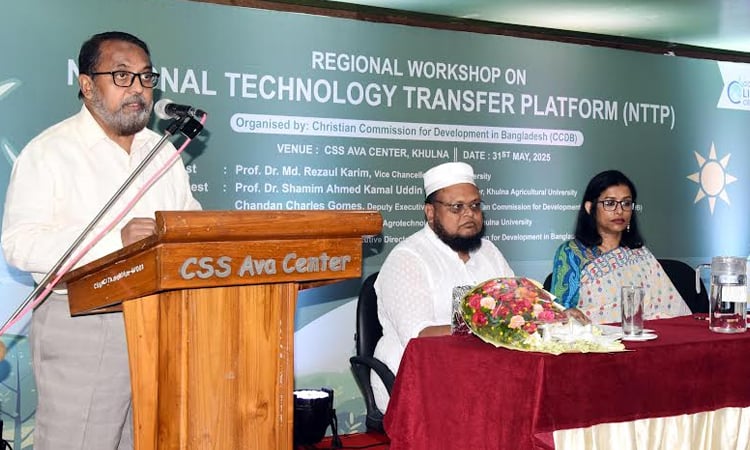News Flash

KHULNA, May 31, 2025 (BSS) - Vice-Chancellor (VC) of Khulna University (KU) Prof Dr Md Rezaul Karim stated today that the technological development becomes truly effective only when it directly benefits farmers and entrepreneurs.
Therefore, beyond just research, active participation in field-level implementation is essential. Effective coordination among scientists, researchers, development organizations, and farmers is crucial to accelerating technology transfer.
He made these remarks as the chief guest at the inaugural session of a regional workshop titled "National Technology Transfer Platform" organized by the Christian Commission for Development in Bangladesh (CCDB) today at the CSS Ava Center in the city.
The VC said that farmers in Khulna and the coastal southwest region face numerous challenges in agriculture, including salinity, waterlogging, and climate change-related risks.
He stressed that alongside innovation, it is necessary to ensure that technologies reach the field so that farmers can benefit practically.
He called for the integration of local knowledge, weather-based innovations, and climate-resilient technologies to open new avenues of possibilities.
Treasurer of Khulna Agricultural University Prof Dr Shamim Ahmed Kamal Uddin Khan and CCDB Deputy Executive Director Chandan Charles Gomez addressed as special guests, while Prof Md Rezaul Islam from the Agrotechnology Discipline of Khulna University also spoke at the event.
CCDB Executive Director Juliet K Malakar delivered the welcome speech, while Md Kamal Hossain, interim coordinator of the Climate Center at CCDB presented the keynote paper.
Following the session, a Memorandum of Understanding (MoU) was signed between Khulna University's Agrotechnology Discipline and CCDB on relevant matters.
The event was conducted by Laboni Akter, a 2021 batch student of Agrotechnology at Khulna University, and Muhammad Mostakim Billah, a PhD student from Gazipur Agricultural University.
In the technical session, representatives from various universities and research institutions participated.
They shared opinions on current technology transfer mechanisms, challenges at the grassroots level, the role of local entrepreneurs, and future actions.